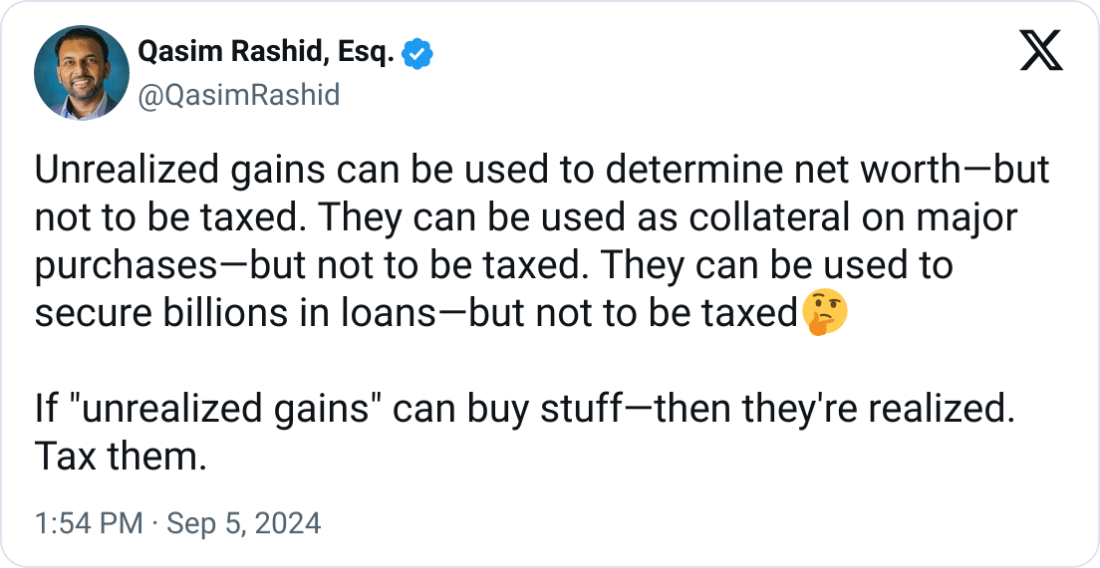this post was submitted on 19 Sep 2024
1598 points (96.8% liked)
Microblog Memes
6037 readers
2174 users here now
A place to share screenshots of Microblog posts, whether from Mastodon, tumblr, ~~Twitter~~ X, KBin, Threads or elsewhere.
Created as an evolution of White People Twitter and other tweet-capture subreddits.
Rules:
- Please put at least one word relevant to the post in the post title.
- Be nice.
- No advertising, brand promotion or guerilla marketing.
- Posters are encouraged to link to the toot or tweet etc in the description of posts.
Related communities:
founded 1 year ago
MODERATORS
you are viewing a single comment's thread
view the rest of the comments
view the rest of the comments

I mean, in the UK, we see the "loan against unrealised, paid off to a zero tax position" trick as the disguised remuneration package that it is.
In fact, it only America, out of the western nations, that allows that.
You took payment of a sum of money, specifically related to unrealised gain. Therefore, the gains are realised.
Thank you. This is the correct solution.
I don't think this is accurate. I'll break down what I mean.
Yes.
Yes.
No. Gains realized would be an unambiguous outcome with zero question to the providence or final outcome. That isn't what a loan against assets are. There is a third step you're skipping.
A lender is making a business decision to absorb the risk of giving you money where they may not get their money back even with the asset you gave them. The value of the assets can change both positively (which would be immaterial to the lender) or negatively (which would absolutely be material to the lender).
In today's rules it means that the lender would lose out if the borrower defaults, and the collateral asset sells for less than the loan amount. The only loser is the lender, and they are choosing to take that risk. The worst case scenario to the lender is losing 100% of the loaned amount (plus whatever trivial costs of administrative overhead for servicing the loan) because the asset is worthless.
In the rules you're proposing (the worst case scenario) if the borrower defaults, the lender loses 100% of the loaned amount, the borrower loses 25%-33% of the value of the loan, and the government would gain 25%-33% of taxes on money that never existed because the asset is worthless.
Don't you worry. I know very familiar with what you mean.
I'm not suggesting that Americas tax rules haven't been utterly compromised by billionaires. I'm saying that, in other countries, that's tax evasion.
They would have to sell to realise the loss and declare it to claim the tax relief. The other alternative is that billionaires never pay tax on their capital gains and that would be a bat shit crazy way to run an economy.
Realization isn't restricted to "unambiguous outcome with zero question to the providence or final outcome" even in the existing tax code, and what does "final" even mean.
It's mostly an administrative convenience that we work with sale as the archetypal realization event. And collateralized borrowing is a very good candidate for realization as it inherently involves valuation.
Regarding losses, yeah you could then realized losses which could be used to offset gains from other sources, rolled forward into future tax years and so forth. That's all a pretty normal part of wealth and tax planning for people with ample and complicated finances. They hire people to handle this, don't worry about them.